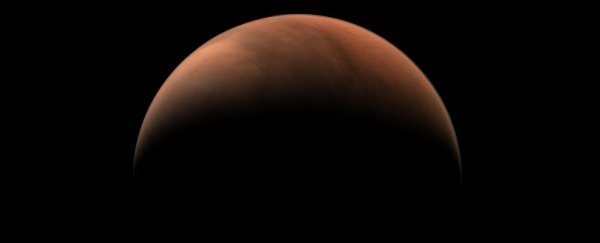China’s Mars probe, Tianwen-1, has been hanging around Mars in a parking orbit for nearly two whole months now, preparing for its rover landing in May.
But it’s not just sitting there in orbit twiddling its antennae. The probe is surveying the planet, orbiting closer, checking out the mission’s chosen rover landing site – and sending back some amazing images of our dusty planetary friend.
On March 16 and March 18, the spacecraft took two panoramic photographs with its medium-resolution camera of a crescent Mars viewed from its far side, with the Sun behind it, from a distance of about 11,000 kilometers (6,835 miles).

From that distance, surface features are visible, different colours streaking across the face of Mars, as well as a faint hazy outline – the planet’s thin but dusty atmosphere wrapped around it like a delicate shell.
Mars is the most visited planet in the Solar System, but there’s a lot we still don’t know about it. With eight orbiters currently in operation (including Tianwen-1 and the UAE’s Hope orbiter, which also arrived in February this year), as well as two rovers and one lander, there are new discoveries being made all the time.
Tianwen-1 carries a lander and rover that will be touching down in the Utopia Planitia, within the Utopia impact basin on the Martian northern hemisphere. It’s a large lava plain, under which vast amounts of ice have been found, and which scientists believe was once home to an ocean before Mars lost its liquid surface water.
Exploring this region, the China National Space Administration believes, could yield some vital clues that could help us piece together even more of the planet’s mysterious history.
A date hasn’t yet been set for the landing, but it is being scheduled for mid-May, according to an address by Chi Wang of the Chinese Academy of Scientists at Space Science Week 2021.
Once the rover has been dropped, the orbiter will continue to circle the planet, performing its own observations, and acting as a communications relay between Earth and Mars.
Hopefully, in the years to come, we will be seeing many more pictures like these.



